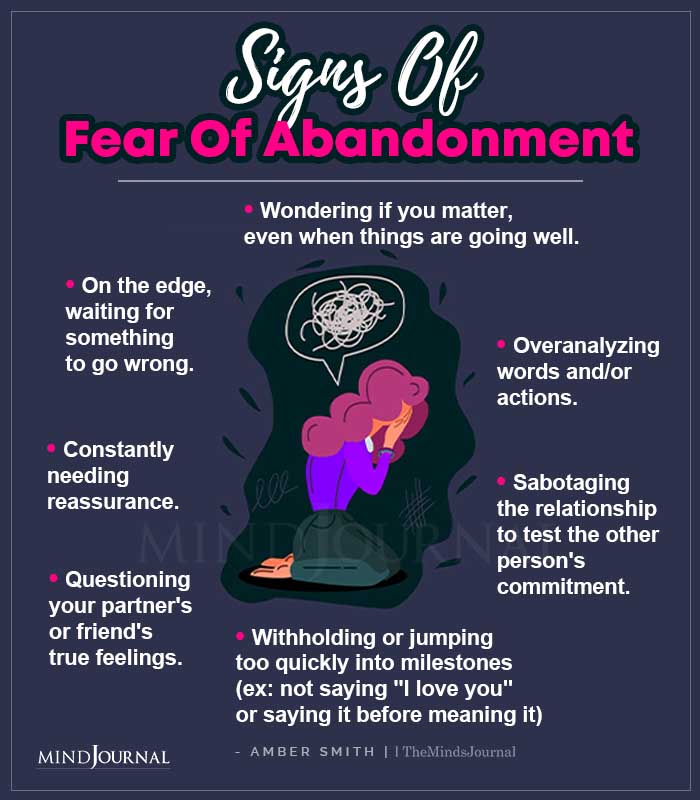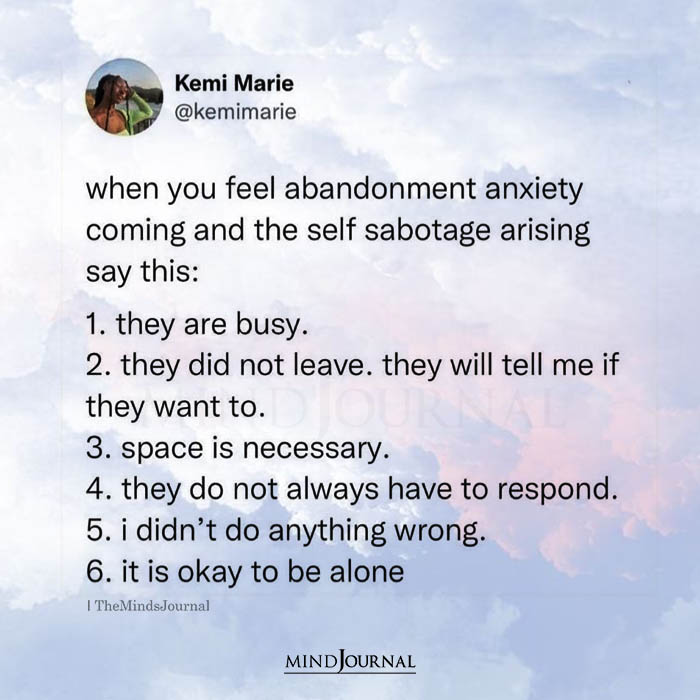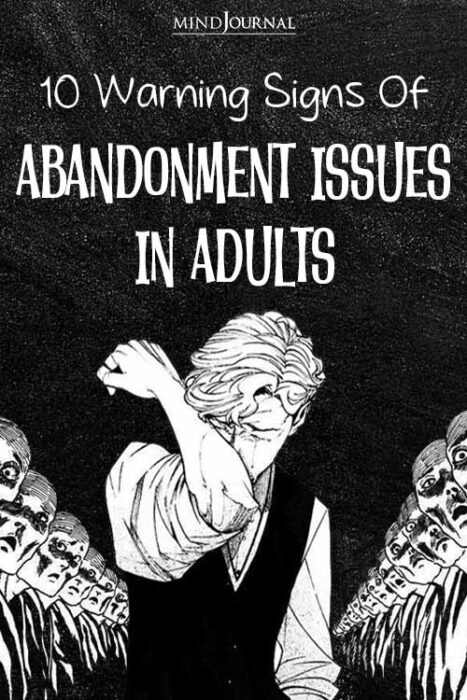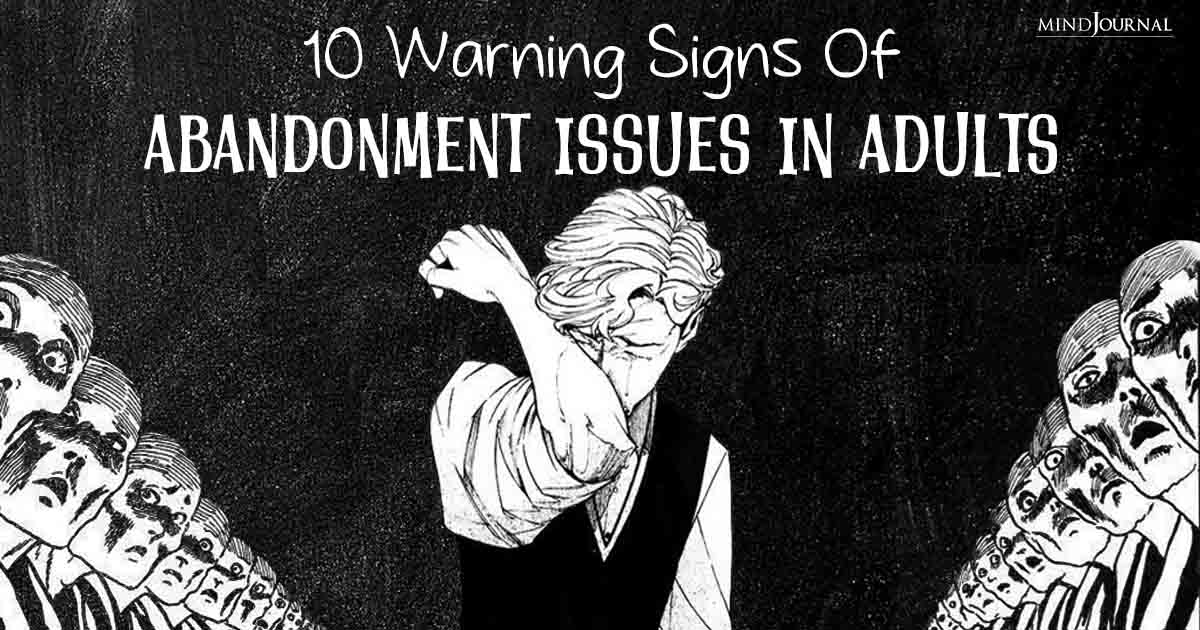Imagine you are sitting in a bustling coffee shop surrounded by lively conversations, and laughter filling the air. There’s a group of people that catches your eye. They seem to radiate an invisible energy, an unspoken longing for reassurance and connection. Welcome to the world of adults struggling with abandonment issues. Today, we are going to talk about the signs of abandonment issues in adults.
We’ve all heard the phrase “abandonment issues” tossed around, but what does it really mean for grown-ups? They are actually the hidden battles that play out beneath the surface, and which end up shaping your emotions, relationships and self-perception.
Let’s explore some of the biggest signs of abandonment issues in adults, and how the fear of abandonment influences their lives.
Related: Understanding The Fear Of Abandonment And Object Constancy
What Is Fear Of Abandonment?
Fear of abandonment is like a shadow that follows you, lurking in the corners of your mind. It’s that nagging feeling that you will be left behind, forgotten or rejected. Generally, this deep-seated fear can stem from past experiences or insecurities, and it can have a long-term impact on your emotional well-being and personal relationships.
For example, you’ve experienced the pain of being left behind before, whether it was a childhood friend who suddenly stopped talking to you or a romantic partner who walked away without any explanation.
Now, the fear of abandonment lingers like an unwelcome guest, sabotaging all your potential relationships and causing you to put up emotional walls, so that no one can ever hurt you again.

10 Signs Of Abandonment Issues In Adults: Are You One Of Them?
1. You have major trust issues.
One of the most obvious signs of abandonment issues in adults is this. Often, feelings of abandonment stem from having a lack of trust in others. This may manifest as forming unhealthy emotional attachments that can affect your ability to give or receive trust.
You might either set unrealistically high expectations for others’ loyalty or choose to distance yourself entirely from relationships to avoid potential let-downs. In really severe scenarios, you may even choose to completely isolate yourself.
2. You have a hard time accepting rejection.
This is more than just not being able to digest rejection and denial. If you have a fear of abandonment, you might refuse to accept continued rejections and put undue pressure on your partner to not leave you.
Even if you know that the relationship is not working out, you might still choose to drag it just because you don’t want another failed relationship and don’t want to be alone. Preventing someone from leaving a relationship they are not happy in, is not just wrong, but can also be considered as abusive.
3. You get attached too quickly.
You may find yourself rushing into a committed relationship immediately after meeting someone new, moving too fast from the first date and declaring it an official relationship, without even asking your partner.
You have a tendency of rushing into relationships because you are petrified of losing them. There’s a fear within you that what if they find someone else, someone better than you.
You don’t want to have regrets about letting “the one that got away” slip through your fingers. Your abandonment issues cause you to hold onto them tight, even if they are not ready to be in a serious relationship.
Related: 18 Signs Of Abandonment Trauma You Might Relate To And How To Thrive Again
4. You feel unworthy of love, even though you constantly crave it.
One of the biggest signs of abandonment issues is that you constantly feel like you don’t deserve to be loved, and there is this sense of loss that always haunts you.
When someone you love leaves you, it often feels like you won’t find that kind of love again. If you do find love it might feel too good to be true, which makes you fearful and hard to accept if those feelings are real.
You may start believing that you don’t deserve their love and unintentionally push them away to seek affection from others.
5. You struggle with insecurity and uncertainty.
Doubting yourself and feeling unworthy are common signs of abandonment issues in adults. You often feel under-confident and search for validation from others.
There are times when you feel vulnerable and exposed even when you are surrounded by people who are actually very supportive of you. The fear of being abandoned again can make it hard for you to trust others, and even trusting your own instincts feel like a massive challenge.

6. You are a people pleaser and you just can’t seem to help it.
You always try to make others happy, especially in your relationships, and even at the cost of your own happiness. This often results in weak personal boundaries and a tendency to agree with everything your partner suggests.
You prioritize their happiness over your own. You worry that not meeting their needs could push them away. Soon, you might start feeling resentful for constantly putting their needs first.
This resentment can lead you to believe that the relationship was always doomed to fail.
7. You constantly imagine your partner leaving you.
Being apart creates a mental space where the fear of abandonment amplifies. You constantly fear that your partner is going to leave you for someone else, and you will be left alone again, picking up the pieces.
Your mind starts to tell you that your partner is planning to break up with you, and this leads to a lot of emotional distress. These intense thoughts make your body believe they are real, leading to severe bouts of anxiety and depression.
Related: 8 Things Love Addicts Do To Control Their Partner From Leaving Them
8. You can be very controlling.
Your attempt to manage your insecurities sometimes goes in the wrong direction; you become really controlling of everything that your partner does, so that they don’t leave you hanging.
Your abandonment issues might come from your past, when many situations were beyond your control, and you felt helpless. This led you to try managing every aspect of your life and relationships in hopes of avoiding past pains.
The fear of unpredictability makes it difficult for you to let things happen naturally and go with the flow. This sort of a controlling behavior makes your partner feel suffocated and trapped, since they don’t have the freedom to make their own decisions.
9. You have a lot of bottled up anger.
One of the most subtle signs of abandonment issues in adults, is that you might have a lot of pent-up anger within you, and you might not even realize it. This anger shows up in unexpected ways.
You might react strongly to minor inconveniences or feel resentment towards your partner without any clear reasons. And even if you have tried to understand the reasons behind feeling like this, it often proves difficult. This has always worked against you and your relationship.
10. You settle or choose to remain in unhealthy relationships, despite knowing so.
One of the glaring signs of abandonment issues is this.
You may choose to stay in a relationship that deep down you know very well is toxic, unhealthy and harmful, rather than be single; the only thing you associate with being single is being lonely, which is really not what singlehood is all about.
Chances are you know that you deserve better or that your partner is abusive and toxic, but you still choose to be with them. Even if they cheat on you and treat you unkindly, you will find it hard to let go of them.
Now that we have talked about the signs of abandonment issues in adults, let’s talk about how to deal with abandonment issues.
Related: Do You Have Abandonment Issues? 20 Telltale Signs And Coping Tips
How To Deal With Abandonment Issues?
- Journaling: Write down your thoughts and feelings surrounding your fear of abandonment, with the aim of exploring them in depth. This will help give you clarity and understanding.
- Mindfulness meditation: Mindfulness meditation techniques can help you stay grounded in the present moment, which then helps to reduce feelings of anxiety that stem from abandonment issues.
- Inner child work: Connect with your inner child through therapy or visualization techniques to nurture self-love and heal past wounds.
- Art therapy: Try to express your feelings through creative hobbies like drawing, painting or sculpting. This provides you with a non-verbal way to process your fear of abandonment.
- Affirmations: How to deal with abandonment issues? Repeat positive affirmations daily to reinforce feelings of self-worth and security, which also counters negative beliefs about yourself.
- Role-playing: Enlist the help of a trusted friend or therapist to role-play scenarios that trigger abandonment issues, and in the process, helps you be more assertive and also provides you with healthy coping strategies.
- Group therapy or support groups: Sit with people who also struggle with abandonment issues, offering mutual support, coping strategies and understanding.
- Experiential therapy: You can try out interesting activities, such as equine therapy, ropes course and wilderness expeditions to feel more confident and emotionally resilient.
- Cognitive restructuring: If you’re wondering how to deal with abandonment issues, then try this. This technique can help you challenge distorted thoughts and beliefs about abandonment through cognitive-behavioral techniques, and replace them them with more positive and realistic perspectives.
- Energy work: Explore modalities like acupuncture or Reiki, to balance your energy flow and address emotional blockages related to signs of abandonment issues.

Takeaway
Dealing with the fear of abandonment can take a massive emotional and mental toll on you. Constantly feeling fearful of rejection and loneliness can gradually turn you into a bitter and resentful person.
The strategies mentioned above can indeed help you a lot, if you are struggling to understand how to deal with abandonment issues. Even if you try a few of these out, I hope you feel better equipped to deal with these difficult emotions.
Related: Self-Abandonment: 3 Ways You Are Abandoning Yourself
Do you relate to any of these signs of abandonment issues in adults? Do let us know in the comments down below!









Leave a Reply
You must be logged in to post a comment.